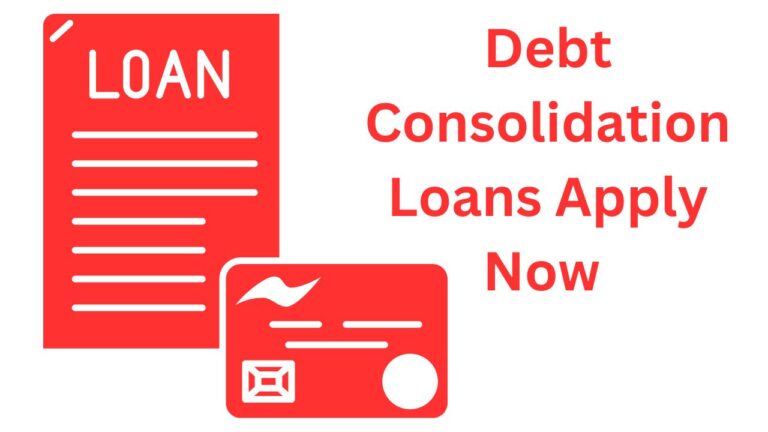Debt Consolidation Loans
Debt Consolidation Loans: Debt can be stressful, especially when you owe money to multiple lenders. Keeping track of different payments, interest rates, and due dates can feel overwhelming. That’s where a debt consolidation loan can help. It allows you to combine all your debts into one single loan, making it easier to manage your payments and reduce financial stress.
What is a Debt Consolidation Loan?
A debt consolidation loan is a type of loan that helps you pay off multiple debts by combining them into one. Instead of paying several creditors separately, you take out a single loan and use it to pay off all your existing debts. Then, you only need to make one monthly payment toward your new loan. This simplifies your finances and may even reduce your overall interest rate.
Debt consolidation loans are most commonly used to pay off high-interest debts such as credit card balances, medical bills, personal loans, and payday loans. They can be obtained from banks, credit unions, or online lenders. The key benefit of these loans is that they streamline your repayment process and may save you money if you secure a lower interest rate than your existing debts.
How Does It Work?
When you apply for a debt consolidation loan, the lender evaluates your financial situation, including your income, credit score, and total debts. If approved, you receive a lump sum of money, which you use to pay off your existing debts. After that, you start repaying the new loan in monthly installments.
Debt consolidation loans can either be secured or unsecured:
- Secured loans require collateral, such as a house, car, or other valuable assets. Since the lender has a form of security, these loans usually have lower interest rates.
- Unsecured loans do not require collateral, but they generally have higher interest rates and stricter credit score requirements.
Benefits of Debt Consolidation Loans
Debt consolidation loans offer several advantages, including:
1. Simplified Payments
Instead of juggling multiple debt payments every month, you only have one payment to focus on. This makes it easier to manage your finances and avoid missed payments.
2. Lower Interest Rates
Many people opt for debt consolidation to lower their interest rates. If you have high-interest credit cards, consolidating them into a loan with a lower rate can save you a significant amount of money over time.
3. Fixed Repayment Schedule
Unlike credit cards, which have variable interest rates and minimum payments that can change, debt consolidation loans have a fixed repayment schedule. This means you’ll know exactly how much you need to pay each month and when your debt will be fully paid off.
4. Improved Credit Score
If you consistently make on-time payments on your new loan, it can improve your credit score over time. Additionally, reducing your credit utilization (the amount of credit you’re using compared to your credit limit) can have a positive impact on your credit rating.
5. Reduced Stress
Managing multiple debts can be stressful. Consolidating them into a single loan simplifies the process and provides peace of mind.
Types of Debt Consolidation Loans
There are several types of debt consolidation loans, each with its advantages and disadvantages. Below are the most common options:
1. Personal Loans
Personal loans are unsecured loans that can be used to consolidate debt. They are available from banks, credit unions, and online lenders. Since they don’t require collateral, the interest rates may be higher, especially for borrowers with poor credit.
2. Balance Transfer Credit Cards
Some credit cards offer balance transfer options with a 0% introductory interest rate for a limited period. This allows you to transfer your high-interest balances onto the new card and pay off your debt without accumulating more interest. However, if you don’t pay off the balance before the promotional period ends, the interest rate can increase significantly.
3. Home Equity Loans
If you own a home, you can use your home equity to secure a low-interest loan for debt consolidation. Since your home serves as collateral, these loans typically offer lower interest rates. However, the risk is that if you fail to make payments, you could lose your home.
4. Debt Management Plans
Some nonprofit organizations offer debt management plans that help individuals consolidate their debts through structured repayment programs. These plans involve working with a credit counseling agency that negotiates with creditors on your behalf.
Things to Consider Before Taking a Debt Consolidation Loan
While debt consolidation loans can be beneficial, it’s essential to consider the following factors before applying:
1. Interest Rate and Fees
Compare different lenders to find the best interest rates and lowest fees. Some loans may come with hidden charges, such as origination fees or prepayment penalties.
2. Loan Term
A longer loan term means lower monthly payments, but you may end up paying more interest over time. Consider the balance between affordability and cost.
3. Your Spending Habits
Debt consolidation is only helpful if you avoid accumulating more debt in the future. If you don’t change your spending habits, you may end up in a worse financial situation.
4. Credit Score Requirements
Some lenders require a good credit score to qualify for the best rates. If your credit score is low, you may need to work on improving it before applying for a loan.
5. Risk of Secured Loans
If you choose a secured loan, be aware that failing to make payments could lead to the loss of your assets, such as your home or car.
Alternatives to Debt Consolidation Loans
If a debt consolidation loan isn’t the right option for you, consider these alternatives:
1. Negotiating with Creditors
Some creditors may be willing to lower your interest rates or offer payment plans if you explain your financial situation.
2. Increasing Your Income
Finding additional sources of income, such as a part-time job or freelance work, can help you pay off debts faster.
3. Cutting Expenses
Review your budget and reduce unnecessary spending to free up more money for debt repayment.
4. Bankruptcy (Last Resort)
If you are in severe financial distress, bankruptcy may be an option. However, it has serious long-term consequences on your credit score and financial future.
Steps to Get a Debt Consolidation Loan
If you’ve decided that a debt consolidation loan is right for you, follow these steps:
- Assess Your Debt: Make a list of all your outstanding debts, including balances, interest rates, and monthly payments.
- Check Your Credit Score: A higher credit score increases your chances of getting a lower interest rate.
- Compare Lenders: Research different lenders and compare their interest rates, fees, and terms.
- Apply for the Loan: Gather the necessary documents (such as income proof and credit history) and submit your application.
- Use the Loan Wisely: Once approved, use the loan to pay off your existing debts immediately.
- Stick to a Budget: Avoid accumulating new debt and focus on making timely payments.
Debt Consolidation Loans
Debt consolidation loans can be a great tool for managing multiple debts, reducing financial stress, and simplifying monthly payments. However, it’s important to understand the terms of the loan and choose the right option for your situation. With proper planning and responsible financial habits, you can take control of your debt and work towards a more secure financial future.
For more financial advice, consider checking out this resource. Also, learn more about loan options here.



